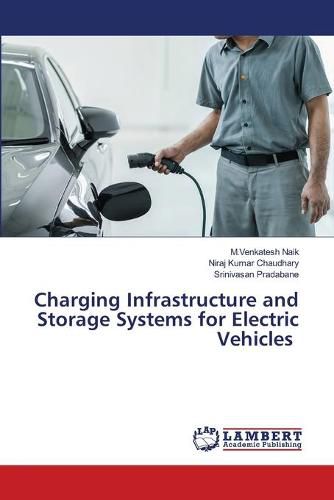Readings Newsletter
Become a Readings Member to make your shopping experience even easier.
Sign in or sign up for free!
You’re not far away from qualifying for FREE standard shipping within Australia
You’ve qualified for FREE standard shipping within Australia
The cart is loading…






This title is printed to order. This book may have been self-published. If so, we cannot guarantee the quality of the content. In the main most books will have gone through the editing process however some may not. We therefore suggest that you be aware of this before ordering this book. If in doubt check either the author or publisher’s details as we are unable to accept any returns unless they are faulty. Please contact us if you have any questions.
The Electric Vehicles (EVs) are heavily dependent on electrical energy storage technologies (ESTs) and EVs need power condoning units (PCUs) for operations like battery charging, power flow control of electric motors and supplying power to the auxiliary power load in a EV. The charging infrastructure for the EVs and Transit busses is one of the key requirements in increased usage of electric automotive. the electrical energy can be stored by converting it into the various domains like, electrochemical, electrical, chemical, thermal and mechanical. Out of these, the electrical, electrochemical and chemical storage systems are mostly used in EVs. Also, The power conditioning units (PCUs) in an electric vehicle (EV) has multiple individual power converters which controls the power flow among various energy storage devices, power sources and EV motor. The PCUs ensure the reliable, controlled and optimum charging of batteries used in EVs. This book presents the various storages systems for EV, power converters topologies for EV charging and charging infrastructure for electric transit buses. The recent advancements and comparative study of storage and charging schemes are emphasized.
$9.00 standard shipping within Australia
FREE standard shipping within Australia for orders over $100.00
Express & International shipping calculated at checkout
This title is printed to order. This book may have been self-published. If so, we cannot guarantee the quality of the content. In the main most books will have gone through the editing process however some may not. We therefore suggest that you be aware of this before ordering this book. If in doubt check either the author or publisher’s details as we are unable to accept any returns unless they are faulty. Please contact us if you have any questions.
The Electric Vehicles (EVs) are heavily dependent on electrical energy storage technologies (ESTs) and EVs need power condoning units (PCUs) for operations like battery charging, power flow control of electric motors and supplying power to the auxiliary power load in a EV. The charging infrastructure for the EVs and Transit busses is one of the key requirements in increased usage of electric automotive. the electrical energy can be stored by converting it into the various domains like, electrochemical, electrical, chemical, thermal and mechanical. Out of these, the electrical, electrochemical and chemical storage systems are mostly used in EVs. Also, The power conditioning units (PCUs) in an electric vehicle (EV) has multiple individual power converters which controls the power flow among various energy storage devices, power sources and EV motor. The PCUs ensure the reliable, controlled and optimum charging of batteries used in EVs. This book presents the various storages systems for EV, power converters topologies for EV charging and charging infrastructure for electric transit buses. The recent advancements and comparative study of storage and charging schemes are emphasized.